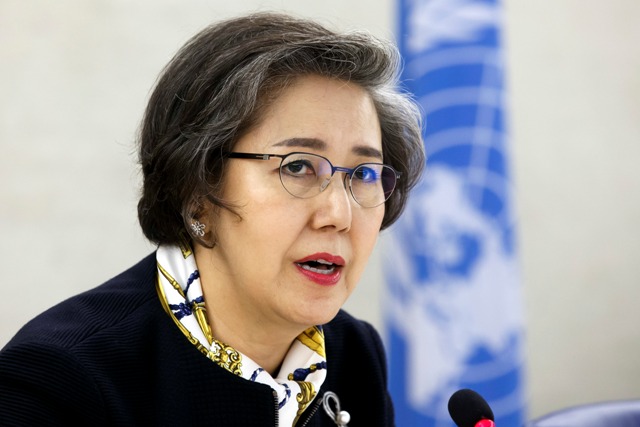Special Rapporteur Yanghee Lee told a news conference at the conclusion of her 12-day visit that she faced "increasing restrictions" on her access.
Lee said the government, citing security concerns, had prevented her from visiting parts of the northeast where the military is accused of abuses against civilians in its conflict.
She was also not allowed to visit three journalists detained last month by the army and charged with contacting a rebel group, despite the site of their detention being a popular tourist spot, the human rights envoy said.
Myanmar regularly blocks monitors and journalists from travelling to areas near the conflicts, citing concerns over safety. Security officials say monitoring prominent people is a normal part of their work.
Lee said it was "unacceptable" that people meeting her were watched and even followed by agents she suspected to be from the police Special Branch that once stalked political opponents during almost half a century of dictatorship.
"I have to say I am disappointed to see the tactics applied by the previous government still being used," she said.
"In the previous times, human rights defenders, journalists and civilians were followed, monitored and surveyed and questioned. That's still going on," Lee added.
National League for Democracy led by Nobel laureate Aung San Suu Kyi came to power last year after a landslide in the landmark November 2015 elections.
She does not oversee the police or the military, which ruled the country for decades and retains its powerful position under a constitution drafted by the former military government.
Aung San Suu Kyi's office did not directly address the issues of access or surveillance, but said it was "disappointed" with Lee's end of mission statement, which "contains many sweeping allegations and a number of factual errors".
"We had hoped that the Special Rapporteur's statement would reflect the difficulties of resolving the problems that are a legacy of decades of internal conflict, isolation and underdevelopment," it said in a statement released early on Saturday.
Myanmar is also refusing entry to a separate UN fact-finding mission appointed by the Human Rights Council in Geneva to look into allegations of abuses by the security forces.
The panel has a special focus on the western state of Rakhine, where the army led an operation late last year caused an estimated 75,000 Rohingya Muslims flee across the border to Bangladesh.
About 1.1 million Rohingya are denied citizenship and face restrictions on their movements in Rakhine.
Lee visited the state and credited Myanmar for attempts to implement some recommendations made in March by an advisory panel led by former UN chief Kofi Annan, including the issuing of birth certificates to 20,000 children not previously registered.
Buddhist officials in Muslim-majority areas have in the past refused to draw up such documents for Rohingya newborns.
However, Lee said: "The general situation for the Rohingya has hardly improved since my last visit in January and has become further complicated in the north of Rakhine."
/257
source : Al Jazeera
Saturday
22 July 2017
12:33:04 PM
843583

(AhlulBayt News Agency) - Activists and journalists in Myanmar continue to be followed and questioned by state surveillance agents, a UN envoy said on Friday, at the conclusion of a visit she said was beset by official snooping and access restrictions.
